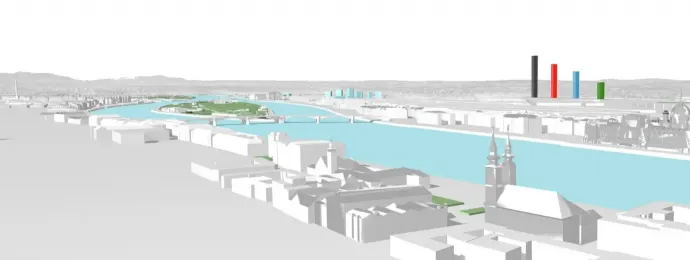Dubai billionaire’s Budapest investment plans may be put on hold as mayor looks to acquire area for city
A roughly 250-acre area of land around an out-of-use, former freight terminal has been at the centre of the latest row between the Hungarian government and the city of Budapest. Rákosrendező, located in the proximity of one of the capital’s popular tourist sights, Heroes’ Square, used to be one of the most significant freight depots, but lost its relevance in the early 1990s and has since then been largely out of use. Over the years, there have been several plans for the rehabilitation of the area, but none ended up being implemented.
The first reports about a firm from Dubai planning to build Europe's tallest skyscraper and erect a whole new neighbourhood in the Rákosrendező area surfaced in November 2023. Budapesters quickly dubbed the project Mini-Dubai and even held a protest against the planned development last March. At the time, Budapest mayor Gergely Karácsony criticised the fact that the state would award more than 100 hectares (250 acres) of land to the developer without a tender or a competitive bidding process.
It seems this failed to move the government, as the National Ministry of Economy (NGM) recently published a statement announcing that “Rákosrendező and its surroundings are set to be rejuvenated thanks to an unprecedented development, as a developer has purchased the area in question". The 85-hectare area around Rákosrendező which is not being used by the railways was sold for HUF 50.9 billion, and Arab investors may build skyscrapers up to 250-500 metres high on the site, the statement detailed.
The group behind the investment is the Abu Dhabi-based Eagle Hills Group, one of the world's biggest real estate developers. According to a communiqué of the Hungarian National Asset Management Agency, they were specifically designated for the investment by the government of the UAE:
“Pursuant to Law XXI of 2024 on the promulgation of the Agreement on Economic Cooperation between the Government of Hungary and the Government of the United Arab Emirates, the property may only be sold to an entity designated as a buyer by the United Arab Emirates – with the prior written consent of the Hungarian government".
The group's announcement about the deal said that they are planning on investing 12 billion euros to build a new neighbourhood in the area under the name of Grand Budapest, Világgazdaság has reported. The project's leader, Mohamed Alabbar promised to create a "world-class green district" on the derelict site.
Alabbar and his company are also behind the mega-investment project called Belgrade Waterfront in neighbouring Serbia. The three-and-a-half billion dollar project bears eerie similarities to the mini-Dubai project planned for Budapest. Speaking of the Hungarian project, the Emirati businessman said that it is more than just a real estate investment. He described it as a reflection of their deep respect and admiration for Hungary's historical significance, cultural life and future ambitions. He believes that the project will not only meet, but exceed expectations. Alabbar has also invested in Albania, where allegations of money laundering have arisen in connection to his project in the country.
Skyscrapers so tall, they would alter Budapest’s skyline
The most interesting part of the communication of the National Ministry of Economy is undoubtedly that the investor will be allowed to build skyscrapers between 250-500 meters of height in parts of the area. This is especially shocking because the plans that were released to the press at the end of 2023 “only” envisaged 220-240 metre-tall skyscrapers. A public opinion poll at the time found that the vast majority of the capital's residents, and even a relative majority of Budapest's Fidesz voters, were opposed to this. The project's opponents raised several objections against it, such as the environmental impact, the height of the planned buildings permanently altering Budapest's skyline, the disturbance of wind tunnels, or the fact that the state is selling off valuable property.
Válasz Online later reported that there were plans to build a 460-metre skyscraper on the site, which would be the tallest in Europe. This now appears to be confirmed.
Reacting to the recent announcement of the National Ministry of Economy, Budapest’s opposition mayor Gergely Karácsony called the decision "pure treason", while member of the metropolitan assembly Dávid Vitézy said that the government had ramped up the selling off of Budapest. But criticism also came from a very unexpected place: the Ministry of Construction and Transport (ÉKM), led by János Lázár. In response to a question from Telex, the Ministry wrote that they do not support the construction of 500-metre high-rise buildings and skyscrapers.
We also asked Budapest's Chief Architect, Zoltán Erő about the subject, who said that according to the current rules set by Lázár's ministry, the maximum height new buildings erected in the city are allowed to reach is 90 metres. The capital would like to ensure that this rule is respected by everyone. He declined to comment on the potential skyscrapers planned for Rákosrendező without seeing the plans, but said he and his colleagues had modelled the impact that building skyscrapers on Rákosrendező would have and concluded that it would certainly be "very ugly".

A skyscraper of this height would rival János Hill, the highest point of Budapest, and would destroy the cityscape visible from the UNESCO World Heritage Sites – from Andrássy Avenue or Heroes' Square, Fisherman's Bastion or Gellért Hill – as well as the view from the Buda Hills, and would effectively vitiate key visual elements. According to Zoltán Erő, a decision on this cannot be taken without an informed consultation.
Erő also said that they were not provided with any plans or substantive information before the decision was announced to the public and neither they nor the capital was involved in the preparation and the decision-making process.
The Chief Architect also opined that
what is happening is disgraceful, as a project of this scale and in such an important urban area should normally only be decided with the involvement of the local community.
In his opinion, in the case of the Rákosrendező project, this would mean consulting the municipalities of the capital's 13th and 14th district as well as the local population, and all parties should be able to have their say on what they would do with the area.
The city’s pre-emption rights
According to the NGM announcement, Eagle Hills will have to settle the HUF 50.9 billion purchase price in three installments. One of the conditions for the first instalment is that the holders of pre-emptive rights to part of the property should waive these rights. One of the conditions for the second instalment is for any remaining legal obstacles to be removed. It emerged the day after the announcement that one of the plots of land concerned, which measures several hundred thousand square metres, is owned by Budapest Közművek ( BKM – the Budapest Public Utilities company), which is owned by the Budapest Local Authority. In light of this, mayor Gergely Karácsony announced that they would like to take advantage of the opportunity to purchase the property themselves and if necessary, the city would also go to court to enforce its pre-emption right.

In response to Karácsony’s announcement, Minister of Construction and Transport, János Lázár wrote: "The Government welcomes the mayor's intention to take advantage of the pre-emption. All they have to do is present a HUF 5,000 billion guarantee, which will make their offer equivalent to that of the Arab investor".
Lázár's post is somewhat misleading, given that according to the relevant laws, the essence of the pre-emption right is to allow the holder of the right to buy the property at the price at which the owner would sell it to someone else. This would indeed amount to HUF 51 billion for the entire area of Rákosrendező, but only a fraction of that for the piece of land in question. Karácsony responded by writing: 'So, Minister, does this mean that someone has already received a cheque for HUF 5 000 billion from the Arab investor? Which of you was it?"
“For the investor, and by implication for the government as well, profit comes first. For us, our home, Budapest comes first", he said.
According to Karácsony, instead of unaffordable luxury high-rises, affordable housing and parks should be established in Rákosrendező. "Just as this government was planning to do before the arrival of the Dubai billionaires. We continue to stand by the Park City concept," (a previous plan for the area’s rehabilitation – TN) he added.
Dávid Vitézy pointed out that the Eagle Hills Group received the land without competition, and the purchase price is not known...Additionally, the investor can build whatever he wants on the land, given that the Parliament passed a law declaring the area an investment project of national economic priority. In practice, this means that half of a Budapest district is now under the control and supervision of another country – so much for the much-talked-about matter of sovereignty," he wrote.
Karácsony and Vitézy are both calling for the government to provide guarantees that the interests of Budapest residents must not be ignored in the course of the development. To this end, they argue that instead of the government laying down the rules for construction in the area in a decree about a project of national economic priority, it should be done by the local government of Budapest. They are also calling for the creation of a board in which the capital, the two affected districts and the state would be equally represented.
Several conditions would need to be met
In the most recent development, the state sent the Budapest Public Utilities company a call for the exercise of its pre-emption right for the entire area of Rákosrendező," Gergely Karácsony, the Mayor of Budapest, announced on his Facebook page on Monday.
According to the document, the BKM cannot just purchase the plot of land for which it has pre-emption rights, but it would have to acquire the entire 85 hectares. In addition, it would need to carry out improvements on it that were agreed between the Hungarian and Emirati governments last year, which is in sync with Minister Lázár’s previous comment about the need for a HUF 5000 billion guarantee.
There is also a reference to the part of the agreement quoted at the beginning of this article, according to which the area can only be purchased by a buyer designated by the UAE government (to which the Hungarian government has given its prior written consent). Both Lázár and Márton Nagy, the Minister of National Economy have said that this international agreement overwrites Hungarian national law about pre-emption rights.
We spoke with lawyer Zsuzsanna Ducsay about this, who said that the relationship between international agreements and national law is an existing legal problem requiring a very specific approach. There are also constitutional court decisions on exactly which takes precedence in certain cases.
This means that an international agreement could potentially override national law, but she does not believe that this is the case here.
Indeed, according to Ducsay, the Hungarian law on the UAE-Hungarian international agreement cited by the Hungarian National Asset Management Agency clearly places the designation of a buyer within the framework of Hungarian law.
Either way, the Budapest mayor remains committed to taking the matter to court to ensure that the city gets to decide what will happen with Rákosrendező. According to Ducsay, such a lawsuit would certainly last for years, which means that even if the capital's company were to eventually lose the case, the proceedings could still drag on for years to come.
For more quick, accurate and impartial news from and about Hungary, subscribe to the Telex English newsletter!